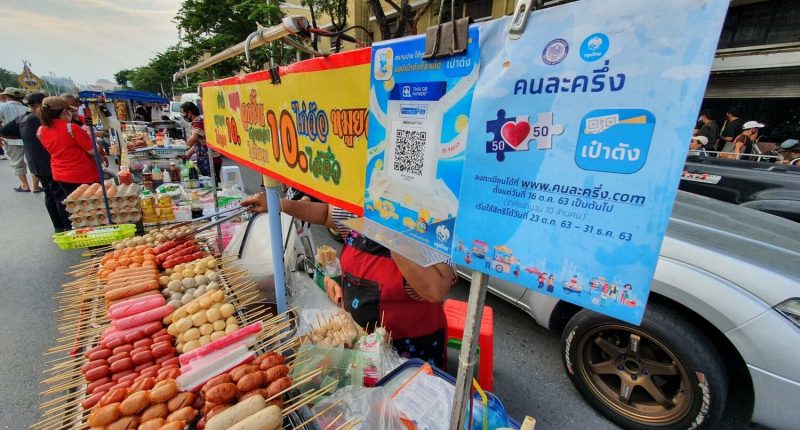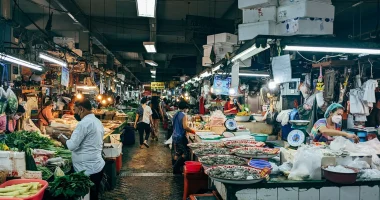Bank of Thailand Governor Sethaput Sutiwatnarueput said strengthening Thai local businesses to compete on the global stage could be an innovative strategy to revitalize the national economy.
Sethaput advocates the introduction of “globally competitive localism,” a concept that leverages the strengths of local entrepreneurs, such as: B. Cultural assets used to create value-added products and services. He believes this will drive sustainable long-term growth.
But making this vision a reality could face obstacles, especially from policymakers reluctant to change entrenched management practices. Ennoo Suesuwan, a member of the National Economic and Social Development Council, stressed that economic development in recent decades has mainly benefited the upper class. That’s why 12.4 million Thais earning less than 100,000 baht a year rely on the country’s social welfare card. “It will be hard for Thailand to compete in the world if the local base is so weak.”
Ennoo added that decentralized governance is urgently needed to strengthen local governments and promote sustainable development.
Fiscal decentralization laws have been in place for 20 to 30 years, allocating 38 percent of the budget to local areas, but many local governments do not receive the full amount they are entitled to. Some governments have diverted budget transfers meant for local projects to fund central initiatives instead, thereby ignoring the spirit of decentralization.
Ennoo, a member of the drafting committee for the country’s 20-year national strategic plan, lamented that decentralization, which aims to develop rural areas as cities thrive, create jobs for youth, and contain big cities to curb migration, has not been implemented in earnest. .
“Decentralization of power to local governments is crucial to drive change and transform communities into economic powerhouses.”
Ennoo noted that some laws need to be amended to give local governments more flexibility. Taniwan Krumongkol, president of the Thai Restaurant Association, said access to capital for local entrepreneurs, especially in the restaurant sector, is crucial to boost competitiveness. Many Thai restaurants are family-run and struggle to accumulate capital to grow.
“In the current economic downturn, the government should support small and medium-sized restaurants and help them access loans at low interest rates from specialized financial institutions.”
Taniwan called on the central bank to encourage commercial banks to ease lending standards for restaurant operators. He also stressed the need for government support in business skills, legal knowledge and research and development.
Thai food
Supporting Thai restaurants will not only strengthen the domestic economy, but also bring Thai food to the global stage and attract more foreign tourists. Taniwan also called on industry representatives to set standards for food safety, hygiene and quality control to improve the reputation of Thai catering.
Ubon Bio Ethanol (UBE) CEO Sreeyot Kowsrat stressed that innovation and environmentally friendly products are essential for Thai companies to compete internationally. UBE has expanded into flour production, producing value-added products such as gluten-free and organic cassava flour, which have attracted the interest of US consumers.
“Consumers are increasingly paying attention to environmental, social and governance standards, which could become non-tariff barriers to Thai exports.”
Despite a slowdown in foreign direct investment (FDI), the Thai economy still relies on foreign companies supporting local businesses as part of a globally competitive localism. Federation of Thai Industries president Cleankrai Thiennukul stressed the need for foreign companies in Thailand to source locally manufactured products to promote the growth of globally competitive Thai companies. According to Cleankrai, several Chinese electric vehicle manufacturers in Thailand have committed to using locally produced parts, with some aiming for up to 90% local content.
“FDI brings great benefits by transferring resources and technology to the host country.”
Promoting tourism
Improving rural economies and promoting tourism in secondary cities could also help support local businesses. Nok Air CEO Wutthiphum Jurangkool suggested leveraging each city’s unique resources through long-term development plans.
“Building a new economy in rural areas will require a large budget before it becomes profitable.”
Wutthiphum also called for government support for infrastructure and investment incentives.
Finally, Sanan Angvolkul, president of the Thai Chamber of Commerce, called on government agencies to work together to improve the quality of life and promote small and medium-sized enterprises in areas such as food, tourism, wellness and logistics. Developing human resources for new industries and transforming traditional energy structures to greener options are also important steps.
The chamber’s partnership with the government aims to develop 10 secondary provinces with high potential for trade, investment and tourism, promoting sustainable development and revitalizing the local economy.









